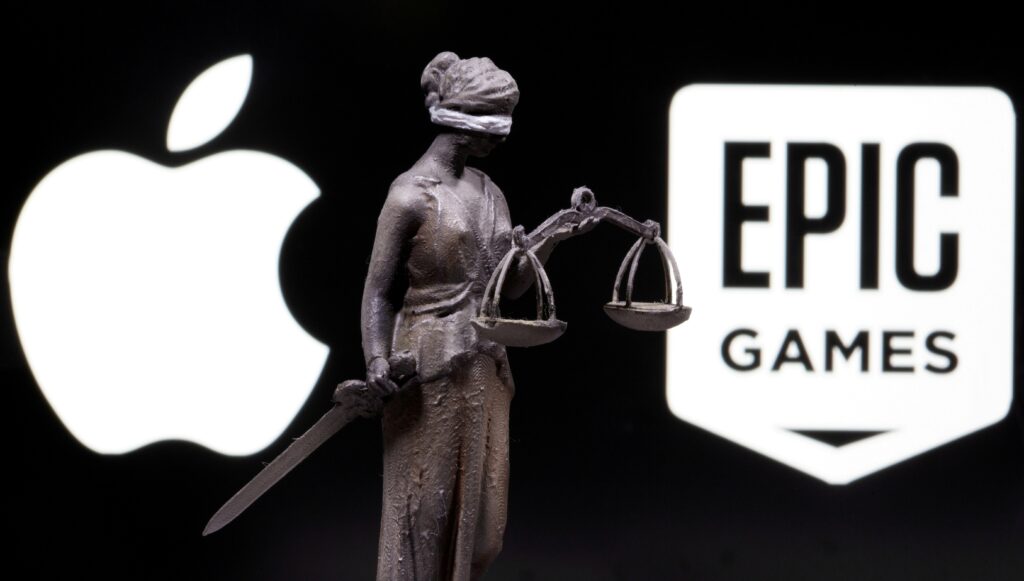This conflict is set against the backdrop of the recently enacted Digital Markets Act (DMA) in the EU, a piece of legislation designed to curb the power of digital “gatekeepers” and promote fair competition. Epic’s decision to file a complaint with the European Commission not only escalates the dispute but also positions this case as a potential landmark in the interpretation and enforcement of the DMA.

As we delve deeper into this “button brawl,” we’ll explore the multifaceted implications of this dispute. From the potential reshaping of the mobile app economy to the broader questions it raises about platform control and regulatory oversight in the digital age, this conflict touches on some of the most pressing issues facing the tech industry today. The outcome could set precedents that reverberate far beyond the EU, potentially influencing how digital marketplaces operate on a global scale.
The Seemingly Trivial Battleground
At first glance, a dispute over button design might seem insignificant. However, this conflict represents much more than a mere aesthetic disagreement:
- It’s a proxy battle for control over the iOS app ecosystem in the EU.
- The buttons symbolize the gateway to app installation and monetization, two critical aspects of the mobile app business.
- Apple’s stringent control over UI elements reflects its broader strategy of maintaining a consistent user experience across its platform.
The specific buttons in question – “Install” and “In-app purchases” – are more than just functional elements. They represent the core of how users interact with and spend money within apps. By controlling these elements, Apple maintains a tight grip on the user experience and, by extension, the flow of revenue within its ecosystem.
The Digital Markets Act: A New Regulatory Landscape
Epic’s invocation of the Digital Markets Act (DMA) is significant:
- The DMA is a relatively new piece of EU legislation aimed at curbing the power of digital “gatekeepers.”
- It requires large tech platforms to allow for more competition and interoperability.
- This case could become an early test of the DMA’s effectiveness and interpretation.
The DMA represents a paradigm shift in how the EU approaches regulation of digital markets. It aims to prevent large platforms from abusing their market power and to create a more level playing field for smaller companies and new entrants. By citing the DMA in its complaint, Epic is essentially asking the European Commission to flex its new regulatory muscles and set a precedent for how the act will be enforced.
The Broader Epic vs. Apple Conflict
This dispute is just one battle in a larger war between Epic and Apple:
- The companies have been at odds since Epic attempted to bypass Apple’s payment system in Fortnite in 2020.
- Their conflict has played out in courtrooms across multiple countries.
- The EU case represents a new front in this ongoing struggle, with potentially global implications.
The history between these two companies adds layers of complexity to the current dispute. Their previous legal battles have touched on issues of market dominance, fair competition, and the rights of platform owners versus app developers. This latest skirmish in the EU is not just about buttons, but about the accumulated tensions and unresolved issues between two of the most influential players in the gaming and tech industries.
Potential Ripple Effects
For the Mobile App Ecosystem:
- If Epic prevails, it could pave the way for multiple app stores on iOS in the EU.
- This could lead to increased competition, potentially benefiting both developers and consumers.
- However, it might also fragment the iOS experience, potentially impacting security and user experience.
The potential for multiple app stores on iOS is a double-edged sword. While it could foster innovation and potentially lower prices for consumers, it also raises questions about quality control, security, and the overall cohesiveness of the iOS platform. Apple has long argued that its tight control over the App Store is necessary to ensure a safe and high-quality experience for users.
For Apple’s Business Model:
- Apple’s App Store is a major revenue generator, and any changes could impact its bottom line.
- A ruling against Apple might force the company to reconsider its approach to app distribution globally.
- It could also set a precedent for other regions to follow, further challenging Apple’s control.
The financial implications for Apple are significant. The App Store isn’t just a distribution platform; it’s a crucial part of Apple’s services revenue, which has become increasingly important to the company’s overall financial health. Any change to this model could have far-reaching effects on Apple’s business strategy and its relationship with developers.
For Developers:
- A more open iOS ecosystem could provide developers with more options for distribution and monetization.
- However, it might also increase complexity in terms of publishing and maintaining apps across multiple stores.
Developers have long had a complex relationship with Apple’s App Store. While it provides access to a massive user base and handles many aspects of distribution and payment processing, it also imposes significant restrictions and takes a substantial cut of revenues. A more open system could give developers more freedom, but it might also introduce new challenges in terms of discoverability and fragmentation.
The Role of the European Commission
The European Commission’s response to Epic’s complaint will be crucial:
- It could set a precedent for how the DMA is enforced in practice.
- The decision might influence how other tech companies approach compliance with EU regulations.
- It could also impact ongoing discussions about digital market regulation in other parts of the world.
The Commission’s handling of this case will be closely watched by tech companies, regulators, and lawmakers worldwide. It has the potential to shape not just the future of app distribution in the EU, but also to influence global conversations about platform regulation, digital marketplaces, and the balance of power between large tech companies and smaller developers.
Conclusion: More Than Just Buttons
While the immediate focus is on button design, this dispute encapsulates larger issues of platform control, market competition, and regulatory oversight in the digital age. The outcome could have far-reaching consequences for the mobile app industry, potentially reshaping how apps are distributed and monetized on one of the world’s most popular mobile platforms.
As this “button brawl” unfolds, it will be crucial to watch not just for the immediate resolution, but for the precedents it might set and the changes it could spark across the global digital landscape. The decisions made in this case could influence the future of digital marketplaces, the relationship between platform owners and developers, and the overall structure of the mobile app economy.
In the end, what started as a disagreement over button design has evolved into a pivotal moment in the ongoing debate about digital regulation and fair competition in the tech industry. The resolution of this dispute may well shape the future of how we access and interact with mobile apps, making it a case of interest not just to industry insiders, but to anyone who uses a smartphone.










Add Comment